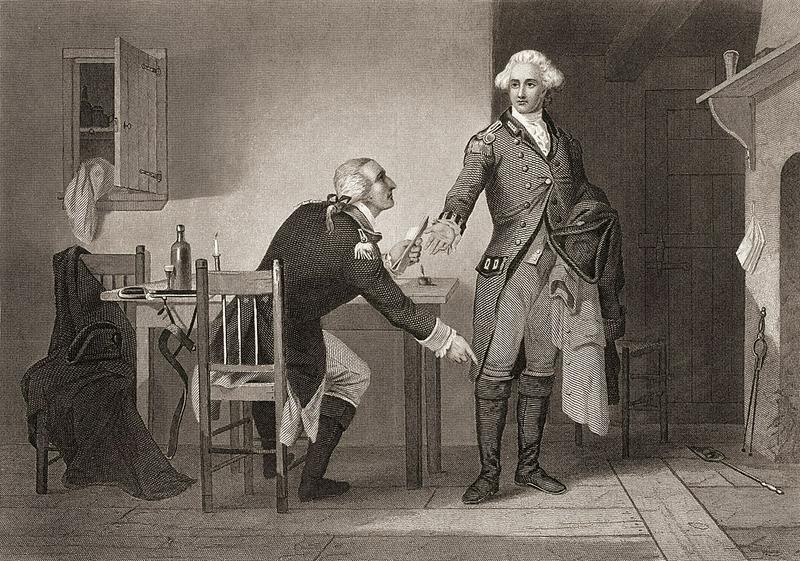Benedict Arnold: Biography And Facts About The Double-Crossing Historic Figure
By | January 14, 2021

While history defines Benedict Arnold by his one act of treason against the United States, there is much more to this key figure of the Revolutionary War than eggs and betrayal. He was, among many other things, a misunderstood, often-overlooked wannabe hero with a messed-up childhood, a chip on his shoulder, and an overly ambitious wife.
A Chip On His Shoulder
Benedict Arnold was born on January 14, 1741 to one of the most prominent families of Rhode Island. His grandfather, after whom he was named, was one of the founders of the Rhode Island colony, but Arnold's father was the opposite of the upstanding Benedict Arnold I. For a time, he was a successful businessman, but after yellow fever took the lives of three of the Arnold children, the patriarch was devastated. He began to drink heavily, and both the family's fortune and its good name plummeted.
Benedict was keenly aware of the whispers about his father and terribly embarrassed by his steady decline, especially when he learned he couldn't afford the private education enjoyed by his peers. Having once hoped to attend Yale, he had to settle for apprenticing with his mother's cousin in the apothecary business. Eventually, seeking shelter from his father's disgraces, Arnold moved to New Haven, Connecticut, where he built up his own apothecary business and worked as a sailing merchant. In his mid-thirties, he was finally successful enough to construct one of the largest houses in New Haven. That sure showed those Rhode Island busybodies.

A Criminal Temper
The Sugar and Stamp Acts of the 1760s soon threatened to curtail his thriving trade business, but Arnold just kept on keeping on with little regard for the ethical implications of his illegal dealings. When a man threatened to report him to the British authorities, Arnold simply publicly whipped him.
Arnold generally had a bit of a temper. He was a prolific challenger of duels, one of the most notorious of which took place in Honduras, where Arnold had gone on a trading expedition, after a British sea captain named Croskie called Arnold a "damned Yankee." Croskie fired first and missed, but Arnold grazed Croskie's arm, puffed out his chest, and taunted "If you miss this time, I shall kill you!" Croskie apologized for insulting Arnold and called an end to the conflict.
But nothing ticked Arnold off quite like the unjust laws the British imposed on the colonists, like those detested Sugar and Stamp Acts. He joined his local chapter of Sons of Liberty, where he went on great tirades about the British, and openly supported going to war. He even took command of one company of Connecticut militiamen.

Arnold In Philly
When fighting with the British broke out in 1775, Benedict Arnold joined Ethan Allen to lead a successful attack on Britain's Fort Ticonderoga in New York, and General George Washington asked Arnold to capture the Canadian city of Quebec. He failed and even suffered a battle wound, but he was promoted to brigadier general anyway and tasked with building a flotilla on Lake Champlain. He led many successful battles against the powerful British navy, but his quick temper, lack of scruples, and inability to take criticism made him some enemies. In February 1777, Congress appointed five new major generalships, and Arnold wasn't one of them.
He was furious to be passed over for the appointment, especially in favor of younger, less experienced men, so Washington decided to throw Arnold a bone, appointing him the military commander of the city of Philadelphia. Arnold immediately took advantage of the position, profiting from a number of conflicts of interest and subsequently facing court martial hearings where he was nevertheless found not guilty.
Benedict Arnold lived the good life in Philadelphia, partying it up with both American and British guests, through which he met the intelligent and beautiful Peggy Shippen, the 18-year-old daughter of a Loyalist sympathizer. Shippen was ambitious beyond her years, always eyeing upward mobility and maintaining correspondence with several British officers even though communication with the enemy was forbidden. She married Arnold on April 8, 1779.

Benedict Arnold's Treason
In May 1779, still stinging from being passed over for a military promotion, Arnold reached out at what historians suspect was his wife's behest to the British general via coded letters written in invisible ink to negotiate his allegiance. Certain he would soon be given command of the American fort at West Point, he agreed to sneak the facility's plans to the British, specifically Major John Andre, a former paramour of Arnold's wife. When Andre was caught with the plans, Washington knew Arnold had betrayed him. He managed to escape aboard a British ship bound for England, but Andre was hanged while Shippen played dumb. Her act worked, and she later sailed to England to join her husband.
The British made good on their promises to Arnold, offering him a brigadier generalship to lead British troops against his former countrymen, but they understandably distrusted him, and once the war was over, he was basically back where he started. He was lambasted in the media and prevented from taking some military posts, forcing him to return to trading on the high seas. He never returned to the United States, and when he died in 1801, he received no military honors—just as he hadn't granted any honor to them.

